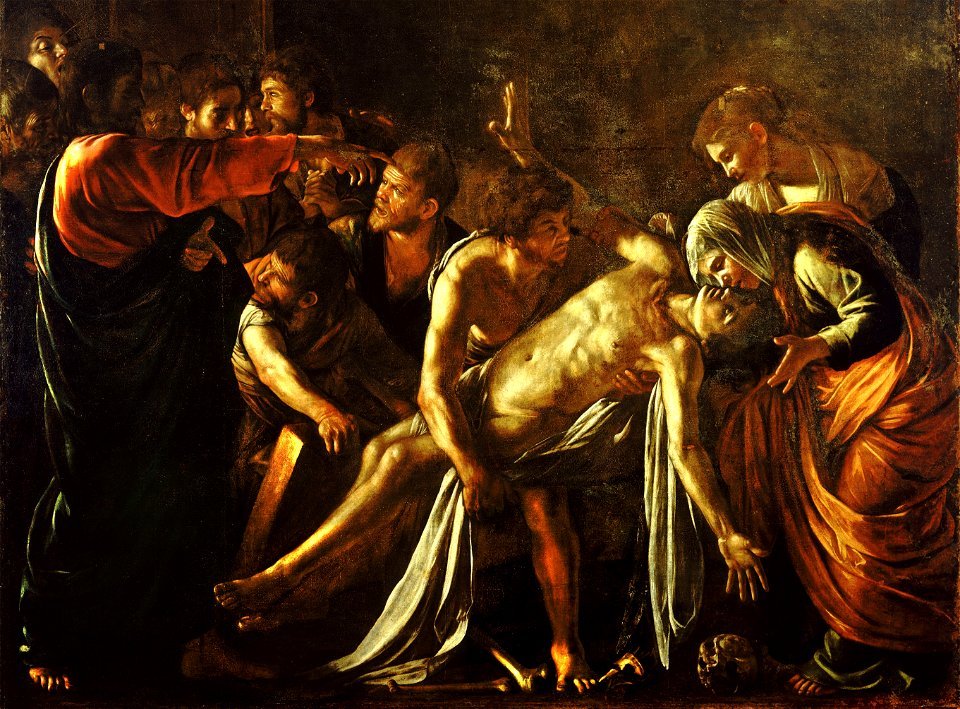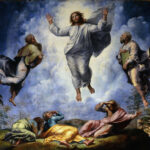A second installment of my experiment: a commentary on the Sunday readings from a different perspective. Nonetheless I reiterate my opposition to giving space to the laity in Mass or the possibility to hold a sermon. That’s to be reserved to priests, despite the current state of affairs, where conformism and selling out to the enemy are common sights in homilies.
As was the case last Sunday, this fifth of Lent presents us with a detailed and sensational story from the Gospel of John, the last one in chronological order.
5TH SUNDAY OF LENT – YEAR A

Caravaggio, The Resurrection of Lazarus, 1609
A most extraordinary miracle: a poor sap who’s been dead for days already, Lazarus, is resurrected by Jesus, as the ultimate sign, before his definitive resurrection, of his being Lord over life and death.
Allow me to unworthily echo the words of Vittorio Messori, the famous Italian writer of which I have been just one reader among millions. Messori evidently draws on centuries of Catholic doctrine and exegetics when he says, basically: in these passages there is enough light to believe, but also enough darkness for those who want to remain incredulous. Human freedom is at stake, and this is a very subtle game, on the razor’s edge, so to speak.
In fact modern skeptics and exegetes typically say: the richest stories which seem designed to convince and have a clear doctrinal foundation in the background, are those that come to us from the latest gospel, written after a century or so by leaders of the primitive community. They aren’t credible because they say too much, and it is precisely that time separation that allows them to add useful details and notes of color, while the witnesses who could say otherwise are no longer alive.
On the contrary, according to an orthodox reading, this later testimony (which has come down to us through John, the young Apostle who was privileged to live a long life in order to bring his direct witness to a later generation) wasn’t presented before just to protect Lazarus and his family from retaliation, since they were exposed to persecution for their being easily identifiable from the narration.
Which of those two versions to believe? As I just said, there’s a tricky balance at play here: God does not force us to believe, and in this universe no testimony is free from doubts… So, how are we supposed to play this game, to get a meaningful chance to make sense of faith? The trick is in earnestly looking for the truth. For this reason, as Louis Pasteur once said, if you study hard enough you regain the faith of a Breton peasant. And if you study even more, you regain the faith of a peasant woman, still a Breton though. Too bad we don’t have the father of modern medicine at hand, to ask him what was so special about Brittany.
Don’t believe John?
Let’s go back to the text. If you have prejudices about what should define your being smart and sophisticated, you may think the idea of John the Apostle living a long life and having the opportunity to write last sounds too convenient to be true. But think about it: the skeptic and the modernist scholar treat every subject as if -in all cases- it were necessary to exclude every possibility other than the most trivial one…
a) John could be the author, but as an alternative
b) someone else may have written that Gospel, then attributed to John to give it a semblance of authority.
The former involves too many coincidences, the latter could have happened in many ways: therefore it’s the latter! After settling for that conclusion, one is almost ashamed that they could even question a skeptical approach and doubt its general assumptions!
But realistically, if a leader chooses a group of followers, it’s not that rare for one of them to survive much longer than the others, until he becomes decrepit! And here we’re contemplating the possibility that God himself decided that it was appropriate to have this long-term witness, so to speak. They want to tell us that we shouldn’t give God the chance to carry out his plans as he pleases! That is, causing something quite normal to happen, albeit not extraordinarily frequent at the time: a robust man who lives for, let’s say, 94 years…
Can you appreciate this total reversal in perspective? In a few decades we have gone from the crudest literalism, when people took for granted that Moses saw two walls of water in front of him, to his right and to his left, with a dry seabed in-between ready to be crossed by feet, to the extreme opposite: now one isn’t even allowed to peacefully die of old age! Additionally, in the spirit of “today” it sounds ridiculously naive to imagine that John, assuming he lived for so long, had the opportunity to write (better: to have someone writing for him his memories; now rich, yes of course, in perspective and insights).
Don’t get me wrong: the experts have thousands of arguments which are certainly not limited to the fact that they don’t like the idea of the most obvious and convenient possibility, i.e. a direct testimony from an Apostle. But how many of these arguments are ultimately motivated by their simple not wanting to adopt a “naive” perspective of faith?
90% of any theory is attitude, choosing a side.
Digging deeper:
the willingness to dig separates a serious and earnest inquiry from the attitude of those that only care about getting approval from their colleagues and the media.
For example, in chapter 21 of the same Gospel, in verse 23, we find an awkward explanation regarding John’s longevity: “The rumour then went out among the brothers that this disciple would not die. Yet Jesus had not said etc…” Check for yourself: it’s quite a clumsy explanation, due to the belief, spread in the early Christian community, that the Second Coming of Christ and the end of the world would come shortly, and the evangelist disciple, John, would live until that moment.
A clear text difficulty: this is definitely not the kind of anecdote one invents; both because it is counterproductive, putting your movement in a bad light (what did they believe in? Fables, wild rumors, bogus prophecies?) and because the mind of a writer doesn’t work like that, piling up incongruous and incomplete traces of perplexing stories.
No, this is one of the many details that cause people to say: there is a real story behind, an account which goes beyond the will and interests of the writer. These are the criteria of credibility for the Gospels: they cannot be quantified, weighed, demonstrated. But they are convincing, for those willing to be convinced.
And now, Lazarus:
would the evangelist really have invented this story, to demonstrate the power of Christ over death? Please notice there’s no ambiguity here. The miracle is striking because it’s indisputable. This guy had been decomposing for days. The story is either a total fabrication, or it’s proof that Jesus has the power of God, to give life. There is no middle ground. Also: God would not bear witness in such a striking way to a mere prophet, one who was subsequently misunderstood. And there are no coincidences, anomalous medical cases, perhaps herbal treatments (?) that can explain the events… No, we have to resort to the supernatural. A tremendous and fantastic sign, or a lie: choose!
Here we can find once again the theme of God’s discretion: the resurrection of Lazarus takes place in Bethany, in a small village, plus this story was spread after decades from the events. So as to leave a mark, but without overdoing it. A human author high on incense would have come up with a more memorable and consequential setting. This indicates there was no freedom to do so: the actual data, the witness accounts, couldn’t be ignored or overwritten.
Why so much Lazarus and so little Jesus?
If there is one thing that catches the eye when reading the Gospels, it is this: compared to the long narration of the Passion of Christ, which constitutes the core and bulk of the text, very little is said about the Resurrection, and in a way that many would judge unsatisfactory, if not downright unconvincing.
Now… modern experts want to imply that, having the liberty to insert in the Gospel a fake story of resurrection, the author could have steered in a new direction, with the previously unheard-of story of Lazarus, instead of applying corrections to the account of the events surrounding the risen Jesus? He could have added decisive details, memorable encounters (with his enemies, with the Virgin Mary…), answers to the pressing questions from the community….
No: the additions made by the last evangelist to the narration involving Jesus after the resurrection are minimal: he speaks as one who knows a few things and can present his memories as seen in perspective, but cannot change or invent.
Also in chapter 21 of John we find the disciples, even the Apostles, who meet the risen Jesus and… don’t they recognize him? They don’t recognize him right away! It takes quite a while.
Think of it: if it weren’t an authentic testimony, how absurd to insist the primitive Christians could have conceived such a story, causing themselves embarrassment till the end of times, with detractors and skeptics saying “See? It wasn’t him!”
Folks, that’s not how one forges fake stories!
Known criteria of biblical exegesis
This idea, that I described as a sort of tricky game, is based on subtleties: the way in which the evangelical testimonies reach us is believable precisely because there are embarrassing, inappropriate parts that are at odds with the style of a human narrator, or to the desires of their audience, but reflect the chaotic and surprising nature of life. Sometimes the witnesses contradict each other: yes, that’s a fact. Because such are real chronicles, which record imprecise and conflicting recollections.
Of course we should also keep in mind that in their putting their narration in order, the authors of the New Testament have taken liberties, for didactic purposes: to link events and speeches according to a non-chronological scheme, or to put down appropriate words allegedly uttered by our protagonists whose precise content, however, was not preserved, as there were no stenographers present, nor journalists with their notebooks (but on the other hand the teachings of Jesus, in the rabbinical style, were presented in an easy-to-memorize form!)
The necessary commitment of a modern Christian
I know that many couldn’t care less for this type of diatribe. They prefer to have to listen to a standard sermon and then move on: we already have faith, while at the same time we cannot convince anyone who doesn’t want to believe.
It’s hard to truly contemplate the possibility that in the texts of our faith there could be not just inaccurate but outright forgeries.
Yet we don’t live in the world of Christianity anymore; gone is the time of omnipresent, commonly-shared truths. The cultural horizon and the meaning of words back then were well defined, more or less static, reassuring.
We cannot rest on our laurels piggybacking on a reliable old system that marches on on its own, despite our lack of commitment. Nowadays the opposite is true. There isn’t much solid ground left.
The crisis is here, and it’s momentous. Only those who take criticism seriously will keep their faith. And the basis for this stronger faith will be that of prioritizing knowledge, study, caring only for the truth.
We must learn to think in these terms: to question our assumptions, to ponder the verisimilitude of the text, to face the criticism coming from skeptics. Getting to the bottom of our doubts as well.
The alternatives are either to close ourselves in an ever smaller bubble, surrounded by like-minded believers but out of touch with reality, or to lose our faith, becoming prisoners of a system of thought that comes from the outside, from the world, and which through our ignorance would seem irresistible, invincible.
Today many Christians, whose hope is to avoid hearing about embarrassing exegetical theses, or about the evolution of the species, about intelligent computers… make me think of a population that, faced with ever more present threats of war, can only say “We want peace, let’s hope nothing bad happens, let’s not think about it”.
No, we have an escalation here. Knowing a thing or two means being able to unmask the inconsistency of the theses of the ignoramuses that sneer at you on social media. But when you face someone more knowledgeable, whose citations put you on the spot, you need to study more; then you may be able to defuse his/her arguments, because they turn out to be inconsistent too. And yet (I’m aware of it) around the corner there’s always a mightier challenge, one which would throw me off balance and could cause a crisis of faith.
We need to arm ourselves, with the search for the truth as the ultimate goal. That’s essential, that’s what works, not the a priori defense of one’s faction, however noble.
Second conclusion: the emotional Jesus
Since I’ve already gone off the rails, not respecting my alleged commitment to conciseness or the goal to focus on a single, direct message, let me have a swing at the main theme of this Gospel reading.
There are two focal points in this miracle, not just one. Notably:
1. the miraculous resurrection and
2. the weeping Jesus.
Better commentators could delve appropriately into the latter theme, which points us to this astonishing thought: Christ’s humanity.
Perhaps I have something unique to say on this after all; possibly almost unheard of.
Now let’s go back to the issue of verisimilitude: this sort of apparent weakness in Jesus’ attitude is one of the uncomfortable details that a human author wouldn’t dare to devise while giving life to an imaginary character. First of all due to the impression on your readers/listeners: struck by a sentimental and weak attitude, easily considered unmanly and not worthy of a good leader. But also considering a predictable misunderstanding: his crying could induce many to think he had no foreknowledge of the upcoming miracle, or was not sure it would work.
Jesus throws you off here because, despite this imminent, spectacular resurrection, he seems almost overwhelmed by emotion, by pain. On three occasions the narration spends words to underline this. He doesn’t just get watery eyes: at the decisive moment he bursts into tears!
That’s a relatable show of empathy from our perspective, but it’s not exactly a model suitable for a society that is still primitive and brutal in many ways. A man must be tough, relentless, unfazed: a stone face. Otherwise life would overwhelm him. He must show no signs of giving up, lest his adversaries could gain the upper hand. Death, war, robbery, abuses are around every corner.
Here Jesus reacts in a way that seems so out of proportion that I’d confidently say there must be a true story behind. Can you really imagine a classic author depicting a weak, easily moved man as their hero?
Let me reiterate: in order not to miss this crucial detail, we have to abstract ourselves from our modern perspective and put ourselves in the shoes of a man of that era.
Moreover, little Bethany of Judea is just one of the many stops, of the places he visited in his relatively short career as a rabbi, as an itinerant teacher, plus he spent most of his time in Galilee instead. He loved this family of friends, two sisters and a brother, who used to host him when he happened to be in the area. But they were certainly not comparable to a close relative!
He loved. We’re used to speak a lot of love in inappropriate terms, even coming up with, in his case, Mary-Magdalenes and LastTemptations that exist only in trashy novels… Instead, here we see how Christ loves through a simple, pure feeling. A deep friendship; we could say, in simpler terms, that he was fond of them. And given the situation, no doubt he had similar feelings for many others, necessarily. Nonetheless, behold! Look how he weeps, expressing sympathy for this pain, even if he knows it will be soon spectacularly consoled.
This rabbi, this Messiah, surely left memorable impressions because he often embarrassed and baffled his followers.
How extreme and out of proportion, showing despair for the death of an acquaintance!
That’s just too much, not to be authentic.
In retrospect, in the modern perspective that comes from Christianity, his attitude is so admirable, worthy of contemplation: look how deeply he loves us humans, how he suffers, how he explores the heart of the drama of our existence, despite the prospect of eternity and his being equal to God, which should have put an infinite distance between his thoughts and our miseries.
And take notice: he never cries when facing hardship, or in front of those enemies who put him in chains. He doesn’t whine when in pain on the cross. He cries instead the tears of a strong, confident man who knows how to empathize. He’s a protector and would give his life for those he loves. And he knows how to see through things. We have a huge need for male role models like this.










































